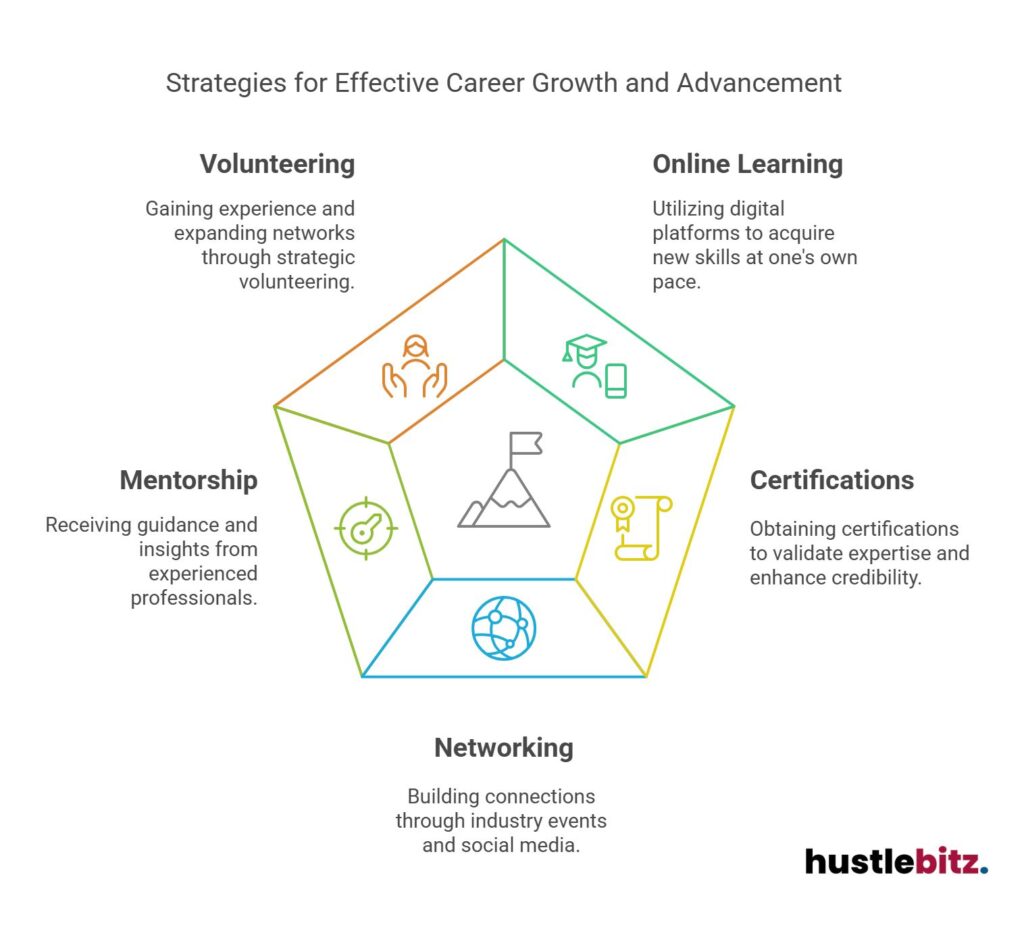Advancing your career skills involves a multi-faceted approach. Utilize online learning platforms to acquire new technical and soft skills at your own pace. Certifications can enhance your credibility and position you for promotions. Networking through industry events and social media expands your connections and opportunities. Seeking mentorship provides personalized guidance essential for navigating your career path. Additionally, attending workshops and participating in professional groups fosters knowledge sharing and collaboration. Volunteering not only builds experience but also develops key competencies. Each strategy plays a vital role, and exploring the details can empower your professional journey further.
Key Takeaways
- Leverage online learning platforms to develop new skills at your own pace, ensuring you stay adaptable to the evolving demands of the job market.
- Pursue relevant certifications to validate your expertise and enhance your professional credibility, positioning yourself for career advancement.
- Engage in active networking through industry events and social media to increase your visibility and create opportunities for potential career growth.
- Seek mentorship for tailored guidance and insights that can help you navigate your career path with greater effectiveness.
- Volunteer strategically to gain practical experience, build new competencies, and expand your professional network while contributing positively to the community.

Online Learning Platforms

Online learning platforms have become indispensable tools for professionals aiming to enhance their career skills in a flexible and accessible way. These platforms offer a broad array of professional development opportunities, catering to diverse interests across various industries. As technology rapidly evolves and workplace demands shift, more professionals are turning to online learning to maintain their competitive edge.
One of the key benefits of online learning platforms is the flexibility they provide, enabling professionals to acquire new skills at their own pace. Whether it’s mastering technical skills like coding and data analysis or honing soft skills such as leadership and communication, these platforms allow individuals to customize their learning journeys to align with their specific career goals and personal schedules.
Moreover, online learning platforms often feature interactive and engaging content, which enhances skill development. Many of these platforms utilize multimedia elements, such as video lectures, quizzes, and forums, which cater to different learning styles and promote a deeper understanding of the subject matter. This approach not only aids in mastering new concepts but also fosters a sense of community among learners.
Ultimately, the use of online learning platforms is a strategic investment in career advancement. By embracing these digital resources, professionals can continuously update their skill sets, adapt to changing job requirements, and position themselves for new opportunities in an increasingly competitive job market.
Networking Opportunities
Building a robust professional network is crucial for individuals seeking to advance their career skills and unlock new opportunities in their respective fields. Networking opportunities can significantly enhance your visibility and credibility, facilitating connections that are vital for career advancement. By engaging with professionals in your industry, you can gain insights into emerging trends, best practices, and potential job openings that may not be widely advertised.
To effectively leverage your professional network, it is essential to actively participate in industry events, workshops, and conferences. These gatherings serve as excellent platforms for meeting peers, mentors, and influencers who can provide invaluable advice and support. Additionally, joining professional organizations or online forums related to your field can further expand your network and offer development opportunities that align with your career goals.
Social media platforms, particularly LinkedIn, have also transformed the landscape of networking. By maintaining an updated profile and sharing relevant content, you can attract connections that may lead to growth opportunities. Engaging with posts and participating in discussions can foster relationships that may open doors to collaborations or job referrals.
Seeking Mentorship
In addition to expanding your professional network, seeking mentorship can significantly enhance your career development by providing personalized guidance and insights from experienced professionals in your field. Mentorship serves as a powerful tool for professional development, enabling individuals to navigate complex career paths and make informed decisions. A mentor can offer valuable feedback, share their experiences, and help you identify areas for improvement, fostering both personal and professional growth.
To effectively seek mentorship, begin by identifying potential mentors within your industry. Look for individuals whose career trajectories align with your aspirations. Reach out with a clear purpose, expressing your desire to learn and grow under their guidance. Building a mutually beneficial relationship is essential; be prepared to share your goals and demonstrate your commitment to self-improvement.
Establishing regular communication is crucial for maintaining your mentorship relationship. This could involve scheduling meetings or engaging in informal discussions. Use these interactions to seek advice, share progress on your goals, and ask for constructive feedback. Remember that effective mentorship is a two-way street; be open to giving back in any way you can.
Ultimately, seeking mentorship is a proactive strategy for career growth. By leveraging the experiences and knowledge of others, you can uncover new ways to improve your skills and advance your career. Embrace the opportunity to learn from those who have already navigated the challenges you face, and watch your professional journey flourish.
Attending Workshops

Attending workshops offers a valuable opportunity to enhance your skills and gain practical knowledge in a focused setting. These structured events are designed to facilitate learning and development across various fields, making them an essential component of career development. By participating in workshops, individuals can gain new skills that are directly applicable to their professional environment, thereby aligning their efforts with their professional development goals.
Workshops typically feature industry experts and experienced facilitators who provide insights and hands-on activities that reinforce learning. This interactive format encourages engagement, allowing participants to ask questions and collaborate with peers. Furthermore, the targeted nature of workshops means that attendees can choose sessions that align with their specific interests and career aspirations, making their learning experience both relevant and impactful.
In addition, attending workshops often provides networking opportunities that can lead to valuable connections within your industry. Building relationships with fellow participants and facilitators can open doors for future collaborations or mentorship opportunities.
Moreover, workshops can serve as a catalyst for self-reflection, helping individuals assess their current skills and identify areas for improvement. This can lead to a clearer understanding of one’s career development path and a more focused approach toward achieving professional goals.
Gaining Certifications

Gaining certifications is a strategic way to validate your skills and enhance your professional credibility in a competitive job market. As industries evolve, the demand for specialized knowledge increases, making certifications a valuable asset for career advancement. They demonstrate your commitment to professional growth and your willingness to invest in your own development goals.
Certifications often cover a wide range of topics, allowing you to expand your skill set in specific areas relevant to your field. By acquiring these credentials, you not only gain in-depth knowledge but also position yourself as a qualified candidate for promotions and new opportunities. Employers frequently prefer candidates with certifications, as these credentials signify that a professional has met established standards of excellence.
Furthermore, gaining certifications can also serve as a motivational tool, encouraging individuals to pursue continuous learning and professional development. The process of studying for certifications can help clarify your career trajectory, allowing you to identify the skills you need to develop further. This clarity can lead to more focused career planning and the achievement of development goals.
Volunteering for Experience

Volunteering for experience offers a practical avenue for individuals to apply their skills in real-world settings while simultaneously building a network and enhancing their resumes. Engaging in volunteer work not only allows participants to contribute to meaningful causes but also grants them the opportunity to gain valuable skills and knowledge that can be pivotal for career advancement.
Through volunteering, individuals can develop competencies that are highly regarded by employers, such as teamwork, leadership, and problem-solving. These experiences serve as a platform for personal development, enabling volunteers to explore new areas of interest and refine their existing skills. Moreover, volunteering provides a unique opportunity to demonstrate initiative and commitment, qualities that many organizations seek in potential employees.
In addition to skill development, volunteering opens doors to networking with professionals in various industries. Building relationships within these networks can lead to mentorship opportunities and insights into potential career paths. These connections are invaluable, as they can also serve as references when pursuing future employment.
For organizations looking for ways to support employee career growth, encouraging volunteering can be a strategic move. By fostering an environment where employees are motivated to give back, companies not only enhance their corporate social responsibility but also promote a culture of continuous learning and development.
Participating in Professional Groups

Engaging in professional groups provides individuals with opportunities to connect with like-minded peers and industry leaders, fostering both personal and professional growth. These groups often serve as platforms for networking, knowledge sharing, and skill development, making them invaluable for anyone looking to advance their career. By joining professional groups, members can access a wealth of resources, including workshops, seminars, and mentorship programs that focus on professional development.
Participation in these groups can significantly enhance career advancement prospects. Members have the chance to build relationships with influential figures in their industry, which can lead to job referrals and exclusive opportunities for advancement. Furthermore, being part of a professional group allows individuals to stay updated on industry trends and best practices, equipping them with the knowledge necessary to remain competitive in their field.
In addition to networking opportunities, professional groups often encourage collaborative projects and discussions that stimulate innovative thinking. Engaging in these interactions can boost confidence and enhance communication skills, both of which are essential for career growth.
To fully leverage the benefits of such groups, it is crucial to be an active participant. Attend meetings, contribute to discussions, and volunteer for committees or events. By immersing oneself in the group’s activities, members can maximize their potential to advance their career and establish a robust professional network.
Ultimately, joining professional groups is a strategic move that can yield significant dividends in one’s career trajectory.
Leveraging Social Media

Leveraging social media effectively can significantly enhance one’s professional visibility and networking opportunities within their industry. By strategically using platforms such as LinkedIn, Twitter, and even Facebook, individuals can connect with industry leaders, showcase their expertise, and pursue various career opportunities that align with their career aspirations.
To begin, creating a robust online profile is essential for professional advancement. This includes detailing past experiences, qualifications, and accomplishments, which can attract potential employers and collaborators. Engaging with industry-related content—by sharing articles, commenting on posts, and participating in discussions—demonstrates thought leadership and a commitment to developing new skills.
Additionally, social media serves as an invaluable tool for employee development. Following organizations, influencers, and professionals in your field can provide insights into emerging trends and skill requirements. Joining relevant groups or forums allows for the exchange of knowledge and resources, further enhancing your professional growth.
Networking through social media also allows for the cultivation of relationships that can lead to mentorship opportunities or collaborations on innovative projects. By actively participating in these online communities, individuals not only expand their professional network but also increase their visibility to potential employers who may be scouting talent for future roles.
Final Thoughts
Advancing your career skills requires a deliberate and multi-faceted approach. By embracing online learning platforms, pursuing certifications, actively networking, seeking mentorship, attending workshops, and engaging in volunteering, you can build a strong foundation for continuous professional growth. Each of these strategies not only enhances your skill set but also expands your opportunities, positioning you for long-term success in your career. Stay committed to your development journey, and remember that consistent effort and adaptability are key to navigating the evolving demands of the job market.




